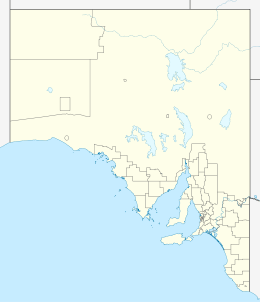Eric Bonython Conservation Park
| Eric Bonython Conservation Park South Australia | |
|---|---|
|
IUCN category Ia (strict nature reserve) | |
 Eric Bonython Conservation Park | |
| Nearest town or city | Yankalilla |
| Coordinates | 35°36′3.24″S 138°19′48″E / 35.6009000°S 138.33000°ECoordinates: 35°36′3.24″S 138°19′48″E / 35.6009000°S 138.33000°E |
| Established | 1 January 1960[1] |
| Area | 6 hectares (15 acres)[1] |
| Visitation | "very few visitors" (in 2009)[2] |
| Managing authorities | Department of Environment, Water and Natural Resources |
| See also | Protected areas of South Australia |
Eric Bonython Conservation Park is a protected area located in South Australia about 16 kilometres (9.9 mi) south of the town of the Yankalilla. The conservation park was proclaimed under the National Parks and Wildlife Act 1972 in 1972 in respect to an area of land already under statutory protection as the "Eric Bonython National Park." As of 2011, it was described as being "a fine, but small, example of the pre-European settlement vegetation that once covered this area." The conservation park contains a dominant forest of Messmate Stringybark with an understorey including "tall shrubs and mid ferns" as well as the nationally endangered perennial herb, Osborn's Eyebright. The conservation park is classified as an IUCN Category Ia protected area.[2][3][4][5]
References
- 1 2 "Protected Areas Information System - reserve list (as of 16 July 2015)" (PDF). Department of Environment Water and Natural Resources. Retrieved 3 August 2015.
- 1 2 "Reserves of the South-western Fleurieu Peninsula Fire Management Plan" (PDF). Department of Environment and Heritage. 2009. pp. 13 & 59. Retrieved 3 August 2015.
- ↑ "Search for feature SA0022726 (Eric Bonython Conservation Park)". Department of Planning Transport and Infrastructure. Retrieved 3 August 2015.
- ↑ "Terrestrial Protected Areas of South Australia (see 'DETAIL' tab)". CAPAD 2012. Australian Government - Department of the Environment. 2014. Retrieved 13 March 2015.
- ↑ "Parks of the Fleurieu Peninsula" (PDF). Department of Environment and Heritage. 2011. p. 3. Retrieved 3 August 2015.